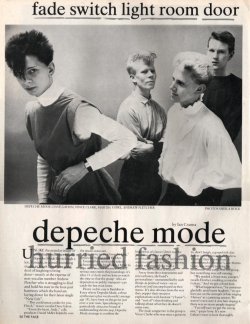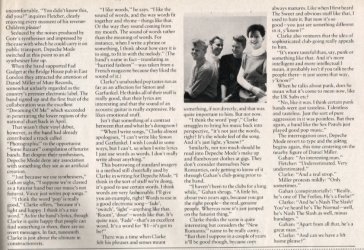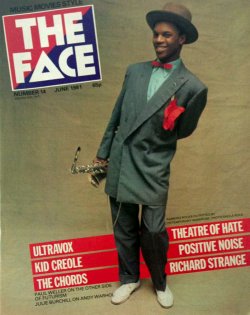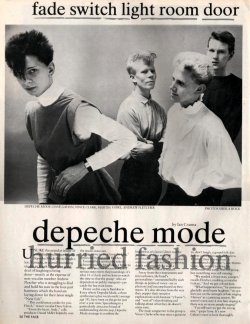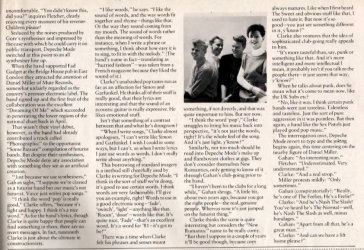You are using an out of date browser. It may not display this or other websites correctly.
You should upgrade or use an alternative browser.
You should upgrade or use an alternative browser.
Depeche Mode Depeche Mode: Hurried Fashion (The Face, 1981)
- Thread starter demoderus
- Start date
Brief-ish interview of the entire band in the studio during the recording of New Life. The 'meat' of the article concentrates on Vince, his musical tastes and how he writes, but a lot of banter between band members - and the writer's picking up on their obvious youth and newness to the music world - keeps the tone of the article reasonably light.
"I'll give you and example, right? Words to use in a good electronic song - 'fade', 'switch', 'light' - anything like that. 'Fade' - that's an excellent word. It's a word for '81 - it's got to be!"
DEPECHE MODE: HURRIED FASHION
Unlike the popular image of unsmiling synthesiser bands, Depeche Mode like to laugh a lot. Tonight, in a small recording studio in South London, a good deal of laughing is being done - mostly at the expense of non-vocalist member Andrew Fletcher who is struggling to find and hold his note in the four-part harmony which the band are laying down for their latest single 'New Life'.
"This could mean a mike for you, Fletch," teases vocalist Dave Gahan.
"From the heart, Andy," calls producer Daniel Miller helpfully over the studio intercom.
"I'm trying to do it from the lung," replies the beleaguered Fletcher.
Eventually a satisfactory take is achieved and the band takes a break to cope with another interview. Here a serious note enters the proceedings: it's after 11 o'clock and we have to watch the time so that the group - who are dependent on public transport - can catch the last train home.
Home in this case is Basildon in Essex where Depeche Mode, a three synthesisers plus vocals outfit (average age 19), have been on the go for just over a year now. Specialising in a particularly attractive brand of undemanding electro-pop, Depeche Mode manage to combine the boppiness of classic Glitter and the precision of disco with the non-traditional appeal of synthesisers and an extra dimension of surprising depth and strength for such a non-macho vocalist as Gahan.
Away from their instruments and microphones, the band's personalities - untrammelled by such things as political views - are as pleasant and uncomplicated as their music. It's also obvious from the way they pepper their tentative explanations with hesitant "y'know"s and "sort of"s that thinking and talking about what they do doesn't come easy.
The main songwriter in the group is Vince Clarke who was once a guitarist in, don't laugh, a gospel folk duo before joining forces with Andrew Fletcher, then playing bass. A schoolfriend of Fletcher's, one Martin Gore, was invited to bring his synthesiser and songs into the group, but something was still missing.
"We needed a front man, a singer," recalls Fletcher, nodding at vocalist Gahan, "And we got a front man.
"What happened was," he continues gleefully amid more laughter, "we got him just on the strength of him singing 'Heroes' in a jamming session. We weren't even sure if it was him singing it, there was so many people singing!"
"I'm still sure we got the wrong one," quips Gore. It's now Gahan's turn to look thoroughly uncomfortable. "You didn't know this, did you?" inquires Fletcher, clearly enjoying every moment of his revenge. Children please!
Seduced by the noises produced by Gore's synthesiser and impressed by the ease with which he could carry it on public transport, Depeche Mode switched at this point to an all synthesiser line up.
When the band supported Fad Gadget at the Bridge House pub in East London they attracted the attention of Daniel Miller of Mute Records, somewhat unfairly regarded as the country's premier electronic label. The band signed up and the first fruit of the collaboration was the excellent 'Dreaming Of Me' which succeeded in penetrating the lower regions of the national chart back in April.
That wasn't their vinyl debut, however, as the band had already contributed a track called 'Photographic' to the 'Some Bizzare' compilation of futurist bands. But despite their synthesisers, Depeche Mode deny any association with something they see as an artificial creation.
"Just because we use synthesisers," Gahan sighs, "I suppose we're classed as a futurist band but our music's not futurist. Vince just writes pop songs."
"I think the word 'pop' is really good," Clarke offers, "because it's light and happy. I think it's a nice word." As for the band's lyrics, though Clarke is quite happy that people can find something in them, there are no overt messages. In fact, tunesmith Clarke is just about the ultimate in constructionists.
"I like words," he says. "I like the sound of words, and the way words fit together and rhyme - things like that. Or they way they sound coming from my mouth. The sound of words rather than the meaning of words. For instance, when I write a phrase or something, I think about how easy it is to sing, to fit in with the melody." (The band's name in fact - translating as 'hurried fashion' - was taken from a French magazine because they liked the sound of it.)
Clarke's unabashed pop tastes run as far as an affection for Simon and Garfunkel. He thinks all of their stuff is really good, that their lyrics are interesting and that the sound of an acoustic guitar is really expressive. He likes emotional stuff.
Isn't that something of a contrast between that and what he's doing now?
"When I write songs," Clarke almost apologises, "I can't write like Simon and Garfunkel. I wish I could in some ways, but I can't, so when I write lyrics I just use words as words. I don't really write about anything."
This borrowing of standard imagery is a method still cheerfully used by Clarke in writing for Depeche Mode. "I think in the sort of stuff we're doing, it's good to use certain words. I think words are very fashionable. I'll give you an example, right? Words to use in a good electronic song - 'fade', 'switch', 'light' - anything like that. 'Room', 'door' - words like that. It's quite nice. 'Fade' - that's an excellent word. It's a word for '81 - it's got to be!"
There was a time when Clarke felt his phrases and senses meant something, if not directly, and that was quite important to him. But not now.
"I think the word 'pop'," Clarke struggles to bring his music back into perspective, "it's not just the words, right? It's the whole feel of the song. And it's just light, y'know?"
Similarly, not too much should be read into Depeche Mode's makeup and flamboyant clothes at gigs. They don't consider themselves New Romantics, only getting to know of it through Gahan's club-going prior to the band.
"I haven't been to the clubs for a long while," Gahan shrugs. "A little bit, about two years ago, because you got the right people - the real, genuine people. Whereas now it's just jumped on the futurist thing."
Clarke thinks the scene is quite interesting but considers the 'New Romantic' name to be really corny. "But then I suppose in a couple of years it'll be good though, because corn always matures. Like when I first heard The Sweet and obvious stuff like that, I used to hate it. But now it's so good - you just see something different in it, y'know?"
Clarke also ventures that the idea of sophisticated club-going really appeals to him.
"It's more tasteful than, say, punk or something like that. And it's more intelligent and more intellectual I mean, it probably isn't if you talk to the people there, it just seems that way, y'know?"
When he talks about punk, does he mean what it's come to mean now, like the UK Subs etc?
"No, like it was. I think certain punk bands were just tasteless. Talentless and tasteless. Just the sort of pure aggression in it was pointless. But then again, a band like the Sex Pistols just played good pop music."
The interrogation over, Depeche Mode revert to type and the joking begins again, this time centering on the nearby figure of Daniel Miller.
Gahan: "An interesting man."
Fletcher: "Underestimated. Very underestimated."
Clarke: "And a real strop."
Miller protests mildly: "Only sometimes."
Gahan (conspiratorially): "Really, he's one of The Feelies. He's a Feelie!"
Clarke: "And he's Nash The Slash! You've heard he's The Normal - well, he's Nash The Slash as well, minus bandages."
Gahan: "Apart from all that, he's a great man."
Clarke: "And can we have a lift home please?"

